John Cronin
Thinks like a politician, talks like a poet. ~ Time Magazine
“We all have a right-to-know the quality of water before we drink it, the quality of air before we breathe it, and the quality of soil before we eat from it. Protection of human health on our rapidly changing planet demands innovations that will make those rights a reality, and prevent tens of millions of illnesses and deaths.” ~ John Cronin
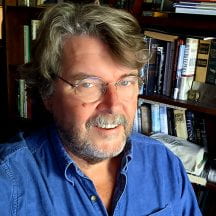 John is an acclaimed environmental advocate named a “Hero for the Planet” by Time Magazine for his groundbreaking work on New York’s Hudson River. He is executive director of the Gale Epstein Center for Technology Policy and the Environment and its Blue Colab program at Pace University’s Seidenberg School for Computer Science and Information Systems. The Center is dedicated to the principle that all people have a right-to-know the environmental conditions in which they live. Its goals include: advancing real-time technologies and information systems for the protection of human and environmental health; reforming public policy to guarantee the public’s right-to-know; and enhancing public understanding of the environment around them through science, technology and education.
John is an acclaimed environmental advocate named a “Hero for the Planet” by Time Magazine for his groundbreaking work on New York’s Hudson River. He is executive director of the Gale Epstein Center for Technology Policy and the Environment and its Blue Colab program at Pace University’s Seidenberg School for Computer Science and Information Systems. The Center is dedicated to the principle that all people have a right-to-know the environmental conditions in which they live. Its goals include: advancing real-time technologies and information systems for the protection of human and environmental health; reforming public policy to guarantee the public’s right-to-know; and enhancing public understanding of the environment around them through science, technology and education.
John’s environmental career began at the urging of folksinger Pete Seeger, whom he met at a dock restoration project on Beacon, NY’s Hudson River waterfront in 1973 (Photo: Pete and John visiting a Hudson River exhibit in Beacon). John began as a volunteer co-editor with Pete and Ed Renehan of the North River Navigator, Clearwater’s monthly newsletter at the time. On July 21, 1974 he was hired as a “River Rat” in the Clearwater Pipewatch program under the direction of the first Hudson Riverkeeper, Tom Whyatt, who had been appointed by the Hudson River Fishermen’s Association (HRFA) in 1971. Pipewatch investigations helped bring the first 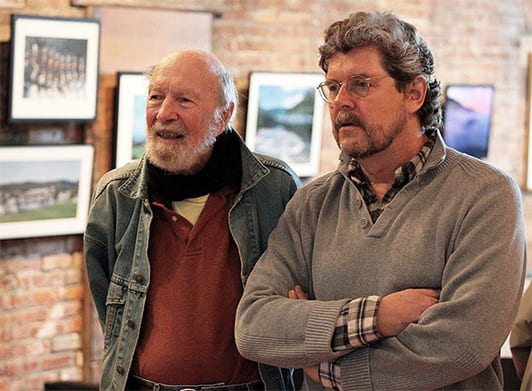 enforcement actions in New York State under the two-year old 1972 Federal Clean Water Act. John became Clearwater’s Environmental Action Coordintator, continuing his investigative work and helping to organize the first citizen movement to close the Indian Point nuclear power plant in Buchanan, NY.
enforcement actions in New York State under the two-year old 1972 Federal Clean Water Act. John became Clearwater’s Environmental Action Coordintator, continuing his investigative work and helping to organize the first citizen movement to close the Indian Point nuclear power plant in Buchanan, NY.
John served as district project coordinator and environmental advisor for Congressman Hamilton Fish, Jr., but resigned over Fish’s support for an anti-choice constitutional amendment. He joined the staff of the New York State Assembly Committee on Environmental Conservation, under its chairperson, state Assemblyman Maurice Hinchey. There he advanced legislation and policies on coastal zone management, river protection, and closure of toxic waste sites. He also served on a special staff investigating U.S. Army involvement in Love Canal, where his research into the history of secret Manhattan Project contractors in New York State revealed Linde Air Products discharged uncontrolled radioactive wastes into the underlying aquifer in Tonawanda, NY. The Department of Energy 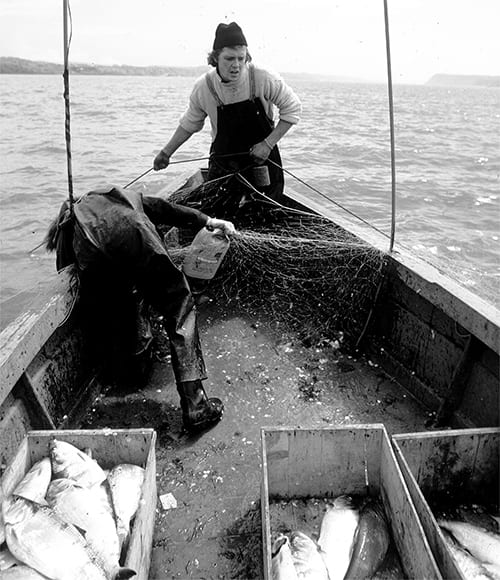 subsequently ordered a cleanup.
subsequently ordered a cleanup.
John left his state legislative job to spend three seasons as a Hudson River commercial fisherman and business agent for the New York State Commercial Fisherman’s Association. In 1982, the Hudson River Fishermen’s Association hired John as the second Hudson Riverkeeeper. His 17-year stint began with a landmark victory against the Exxon Company which he caught sending oil tankers to rinse their holds in the Hudson, and pirating fresh river water for the company’s Lago refinery in Aruba. That year, John founded the Hudson Riverkeeper Fund, Inc. (HRF), and in 1992, he formally consolidated the it and HRFA into Riverkeeper, Inc., a unique pairing of environmental and fishing interests. He co-founded the Pace Environmental Litigation Clinic, which helped bring a string of successful cases against corporations, power utilities and government agencies that resulted in more than $25 million for river restoration.
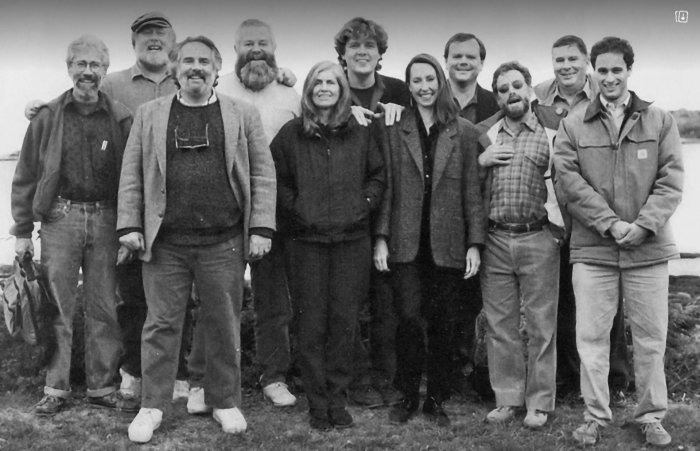 The nation’s only water “Keeper,” when first appointed, John travelled the country helping to found Keeper programs on other waterways, sometimes providing funds for startups, including for Long Island Soundkeeper Terry Backer, and NY-NJ Harbor Baykeeper Andy Wilner.
The nation’s only water “Keeper,” when first appointed, John travelled the country helping to found Keeper programs on other waterways, sometimes providing funds for startups, including for Long Island Soundkeeper Terry Backer, and NY-NJ Harbor Baykeeper Andy Wilner.
He and Backer co-founded the National Alliance of River, Sound and Bay Keepers, which was reorganized and incorporated in 2000 as the Waterkeeper Alliance. Today, 360 water keepers work on six continents. (Pictured are the first WaterKeepers, attending an annual meeting of the National Alliance of River, Sound and Bay Keepers in Portland Maine, circa 1990. Rear, L-R: Michael Herz, San Francisco Baykeeper; Terry Backer, Long Island Soundkeeper; Joe Payne, Casco Baykeeper; John Cronin, Hudson Riverkeeper; Terry Tamminen, Santa Monica Baykeeper; Rick Dove, Neuse Riverkeeper. Front, L – R: Andy Wilner, NY-NJ Harbor Baykeeper; Cynthia Poten, Delaware Riverkeeper; Sally Bethea,Chattahoochee Riverkeeper; Ken Moser, Puget Soundkeeper; John Torgan, Narragansett Baykeeper.)
A multi-talented advocate, John was chief author and lobbyist for three major Hudson River laws including, while Riverkeeper, the Hudson River Estuary Management Act, considered a model for ecological management. He was chief environmental negotiator for the historic New York City Watershed Agreement, necessitated by the city’s non-compliance with the surface water treatment rule of the 1974 Safe Drinking Water Act.
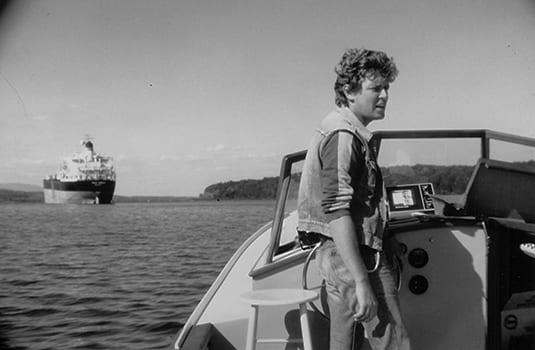
Cronin tracking an Exxon oil tanker off Hyde Park, NY. His investigations documented more than two dozen tanker rinsing events, including 1,500 ft. from the Port Ewen drinking water intake.
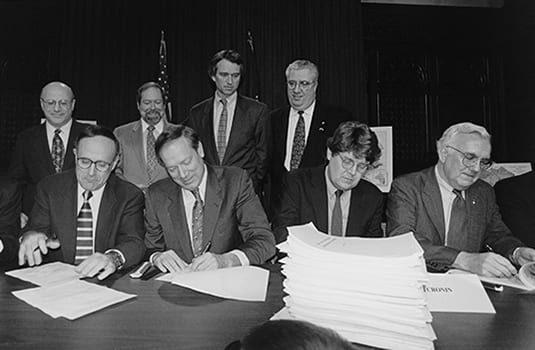
Watershed signing ceremony. L to R, seated, Mayor Rudolph Guiliani, Governor George Pataki, Cronin, Westchester Executive Andrew O’Rourke. Rear, center: Michael Finnegan, and Robert F. Kennedy, Jr..
In 1991, Pace Law School awarded John an Honorary Juris Doctor for his work on the Hudson and with the Clinic. In 1999, he was inducted as the university’s first Resident Scholar in Environmental Studies. Later, as full-time Senior Fellow for Environmental Affairs, he taught environmental policy, and co-founded the Environmental Policy Clinic with Professor Michelle D. Land, which, among many achievements, wrote and succcessfully lobbied the New York Elephant Protection Act prohibiting the use of elephants in circuses and other forms of entertainment. At present, in addition to directing the Gale Epstein Center, he teaches the Blue CoLab courses in Seidenberg School, and advocacy skills in the Master’s in Environmental Science and Policy program, and is Land’s co-instructor in the Animal Advocacy Clinic, which recently helped lead passage of state legislation banning wildlife killing contests in New York.
Among John’s many honors are: Time Magazine Hero for the Planet; Honorary J.D., Pace University School of Law; Jefferson Gold Award for Public Service; Thomas Berry Environmental Award; American Fisheries Society William E. Ricker Award; EPA Region I Environmental Merit Award; EPA Region II Environmental Quality Award; Top 100 Irish-Americans; and Vanity Fair Hall of Fame.
John is co-author of the 1999 book The Riverkeepers, with an introduction by Vice-President Al Gore. His other writings include many popular and academic articles, and Op Eds on environmental policy for The New York Times, USA Today, The Hill, HuffPost, Times Union, LoHud, and the Earthdesk blog, where he was chief contributor and editor. He wrote and co-produced The Last Rivermen, a documentary film about the demise of the Hudson River commercial fishing industry, short-listed as a runner-up in 1992 Academy Award voting.
John has been profiled by many broadcast outlets, including: Today Show, CBS Sunday Morning, NBC Nightly News, Good Morning America, CNN, Charlie Rose, Bill Moyers Reports, History Channel, Outdoor Channel, and more.
He has been the subject of three books and scores of print articles, including::
~ The Wall St. Journal: “A unique presence on America’s major waterways.
~ People Magazine: “Equal parts detective, scientist and public advocate.”
~ The New Yorker: “Professional responsibility and personal obsession meet on the river in John Cronin.”
~ Knight Ridder Newspapers: “A hero in one of the great success stories of the modern environmental movement.”

Honors and Awards
Honorary Juris Doctor, Pace University School of Law
Time Magazine Hero for the Planet
Jefferson Gold Award for Public Service
Thomas Berry Environmental Award
American Fisheries Society Wiilam E. Ricker Resource Conservation Award
EPA Region I Environmental Merit Award
EPA Region II Environmental Quality Award
Founders Award, Santa Monica Baykeeper
Peconic Baykeeper Environmental Award
Outstanding Documentary Short of 1991, Motion Picture Academy Foundation (The Last Rivermen)
EarthWatch Documentary Film Award (The Last Rivermen)
Governor’s Parks and Open Space Award (New York)
Vanity Fair Hall of Fame
Westchester Magazine Top 8 Leaders
Top 100 Irish-Americans of 1999
Publications
Books, Chapters
Cronin, John, Kennedy, Robert F., Jr. The Riverkeepers, Scribner, 1997. Touchstone Paperback, 1999.
Cronin, John. Estuaries: Where Human and Nature Meet. In Bowermaster, John (Ed.). Oceans: The Threats to Our Seas and What You Can Do About It (pp 117 – 130). Participant Media, 2010.
Cronin, John. Duty Bound: A Conversation with Henry Gourdine. In Land, Michelle D. and Rogers, Susan Fox (Eds.). A River’s Pleasure. (pp 37 – 48). Pace University Press, 2009.
Cronin, John. Foreword. In Weigold, Marilyn. Peconic Bay: Four Centuries of History on Long Island’s North and South Forks (pp xi – xiii). Syracuse University Press, 2015.
Cronin, John. Foreword. In Heron, Jim. Denning’s Point, A Hudson River History (pp ix — xi). Black Dome Press, 2006.
Cronin, John. Introduction. In Van Zandt, Roland. Chronicles of the Hudson: Three Centuries of Travel & Adventure (pp ix – xi) Black Dome Press, 1992.
Journals
Cronin, J. (2019) The Cuyahoga Fire at Fifty: A False History Obscures the Real Water Crisis that Never Ceased. J Environ Stud Sci. DOI: 10.1007/s13412-019-00550-3. (Peer reviewed)
Birney, L., Cronin, J. (2019) Environmental habitat restoration and inquiry-based learning with New York City public schools—an urban model in STEM education. J Environ Stud Sci 9, 322–326 https://doi.org/10.1007/s13412-018-0530-5.
Cronin, J. (2015). Michel Jarraud: Presidente de ONU-Agua. Diplomacia, No. 129. https://issuu.com/apuntesinternacionales/docs/revista_diplomacia_agosto_2015
Kolar H., Cronin J., Hartswick P., Sanderson, A. C., Bonner, J. S., Hotaling, L. Ambrosio, R. F., Liu, Z., Passow, M. L. (2009) Complex real-time environmental monitoring of the Hudson River and estuary system. IBM Journal of Research and Development. https://doi.org/10.1147/JRD.2009.5429017 #dblp .
Pfirman, S, Kenna, T, Cronin, J, Land, M. (2005) A “River Summer” on the Hudson. Transactions American Geophysical Union. 86(43):414-414.
Opinion:
The New York Times
Cronin, John. “Don’t Let the Hudson Be Despoiled Again.” The New York Times, 20 Dec 1999. https://www.nytimes.com/1999/12/20/opinion/dont-let-the-hudson-be-despoiled-again.html
Cronin, John. “It’s Time We Got Smart About Drought.” The New York Times, 5 Aug. 1999. https://www.nytimes.com/1999/08/05/opinion/its-time-we-got-smart-about-drought.html
Cronin John. “Power Plant Overload.” The New York Times, 20 May 1999. https://www.nytimes.com/1999/05/20/opinion/power-plant-overload.html
Cronin John, “The Hudson Still Waits for Help.” The New York Times, 12 Feb.1998. https://www.nytimes.com/1998/02/28/opinion/the-hudson-still-waits-for-help.html
Cronin, John and Kennedy, Robert F., Jr. “It’s Our River Let Us Get to It.” The New York Times, 26 Jul. 1997. https://www.nytimes.com/1997/07/26/opinion/it-s-our-river-let-us-get-to-it.html
Cronin John. “The Cost of Electricity Per Species.” The New York Times, 7 Sep.1996. https://www.nytimes.com/1996/09/07/opinion/the-cost-of-electricity-per-species.html
Cronin, John and Kennedy, Robert F., Jr., “Losing Our Day in Court.” The New York Times, 4 Apr. 1996. https://www.nytimes.com/1996/04/04/opinion/losing-our-day-in-court.html
Cronin, John. “Water, Power and the Drought of 1995.” The New York Times, 30 Aug.1995. https://www.nytimes.com/1995/08/30/opinion/water-power-and-the-drought-of-1995.html
Cronin, John. “Save the Hudson’s Fishermen.” The New York Times, 9 May 1992. https://www.nytimes.com/1992/05/09/opinion/save-the-hudsons-fishermen.html
Cronin, John. “Legally Blind on the Hudson.” The New York Times, 1 Dec. 1990. https://www.nytimes.com/1990/12/01/opinion/legally-blind-on-the-hudson.html
Cronin, John. “Who Cares About the Hudson?” The New York Times, 18 Apr. 1987. https://www.nytimes.com/1987/04/18/opinion/who-cares-about-the-hudson.html
Cronin, John J. “The Hudson’s Fishermen.” The New York Times, 18 Apr. 1981. https://www.nytimes.com/1981/04/18/opinion/the-hudsons-fishermen.html
HuffPost
Cronin, John. “Puerto Rico After Maria: When Resiliencia Humana is the Only Resilience That Remains.” HuffPost, 9 Oct. 2017. https://www.huffpost.com/entry/puerto-rico-after-maria-when-resiliencia-humana-is_b_59da16e8e4b0cf2548b3380a
Cronin, John. “A Post-Election Prescription: Environmentalism Without Borders” HuffPost, 30 Nov. 2016. https://www.huffpost.com/entry/a-post-election-prescription-environmentalism-without_b_58324be5e4b0eaa5f14d4760
Cronin, John. “Local Waterways as Classrooms and Laboratories: A Conversation with Professor Joseph Rachlin.” HuffPost, 2 Nov. 2015. https://www.huffpost.com/entry/americas-waterways_b_8448150
Cronin, John. “S.T.E.M.+O = Science, Technology, Engineering, Math and Oysters.”
HuffPost, 26 Oct. 2015. https://www.huffpost.com/entry/stemo-science-technology-_b_8373904
Cronin, John. “The Problem with Hillary’s Arctic Flip-Flop.” HuffPost, 16 Oct. 2015.https://www.huffpost.com/entry/the-problem-with-hillarys-arctic-flip-flop_b_8307878
Cronin, John. “American Environmentalism Should Embrace the Cause of Homelessness.” HuffPost, 8 Oct. 2015. https://www.huffpost.com/entry/american-environmentalism-should-embrace-the-cause-of-homelessness_b_8260732
Cronin, John. “Pope Francis Pointed the World’s Attention to Its Largest Environmental Problem: Poverty.” HuffPost, 2 Oct. 2015. https://www.huffpost.com/entry/pope-francis-environment-poverty_b_8220566
Regional Interest
Cronin, John. “Irene Dickinson: The woman who shut down Indian Point.” USA TODAY Network, 10 May, 2021. https://www.lohud.com/story/opinion/contributors/2021/05/10/irene-dickinson-woman-who-shut-down-indian-point/4971025001/
Cronin, John, Land, Michelle, D. “Coast Guard Must Fully Review on Hudson Anchorages.” The Journal News, 13 Aug. 2017. https://www.lohud.com/story/opinion/contributors/2017/08/06/coast-guard-must-do-full-public-review-hudson-anchorages-view/534101001/
Cronin, John. “Hudson River’s Abuse Continues.” The Journal News, 12 Sep. 2016. https://www.lohud.com/story/opinion/contributors/2016/09/08/hudson-river-abuse-continues/90004504/
Cronin, John. “Earth Diary: A River’s Pleasure.” InsideOut, 14 Dec. 2010.
Cronin, John. “Earth Diary: Crabbing with Bob.” InsideOut, 17 Aug. 2009.
Cronin, John. “Earth Diary: The Power of Film: An Interview with Filmmaker Jim Brown.” InsideOut, 14 Jun. 2009.
Cronin, John. “Earth Diary: The Future.” InsideOut, 27 Sep. 2008.
Cronin, John. “Earth Diary: Why Care?” InsideOut, 31 Jul. 2008.
Cronin, John. “Earth Diary: Hope Swims.” InsideOut, 9 Feb. 2008.
Cronin, John. “Earth Diary: River Love.” InsideOut, 5 Dec. 2007.
Cronin, John. “Earth Diary: Sturgeon.” InsideOut, 8 Oct. 2007.
Cronin, John. “The Riverkeeper’s Creed.” Hudson Valley Magazine, Jan. 2000
Cronin John. “Make GE Pay for Hudson Clean-Up.” Poughkeepsie Journal, 29 Mar. 1998.
Invited Lectures and Presentations
American Fisheries Society
American Littoral Society
Bard College Environmental and Urban Studies Colloquium
Barnard College
Bioneers by the Bay: Connecting for Change (Marion, MA)
Cabrini University
Columbia University Business School
Earth and Religion: Seeking a Common Ground (Annandale-on-Hudson, NY)
Erie Hack 2.0: Rock the Lake (Cleveland, OH)
IBM Smarter Cities Conference (NY, NY)
International Thomas Merton Society General Meeting (Memphis, TN)
International Union for the Conservation of Nature Colloquium (White Plains, NY)
Lafayette College
Lamont Dougherty Earth Observatory of Columbia University
Manhattanville College
Marist College Undergraduate Research Symposium
McHenry County College
Millikin University
Monterey Bay Aquarium Research Institute
Mote Marine Laboratory
Mount St. Vincent College
National Association of College Stores
National Public Gardens Association (formerly AABGA)
New School University
New York Harbor School Commencement
New York State Bar Environmental Law Section
Northern Michigan University
NYSERDA Tidal Power Conference
Oklahoma State University
Pace University School of Law
Penn State Altoona Commencement
Princeton University Geosciences
Rensselaer Polytechnic Institute/Lally School of Management
Rollins College Winter Park Institute
Salisbury University Convocation
Siena College
Skidmore College
Steven’s Institute of Technology
SUNY Empire State College
SUNY New Paltz
SUNY Oneonta
SUNY Purchase
Syracuse University Center of Excellence
Union College
Universidade Norte do Paraná (Brazil)
USEPA Citizen Volunteers in Environmental Monitoring (Narragansett, RI)
Water Cooperation and Conflict (Pace University NYC)
Water Matters! Global Water Conference (Pittsburgh, PA)
Webster University
Westchester Community College

